Search Results for 'turtle farm'
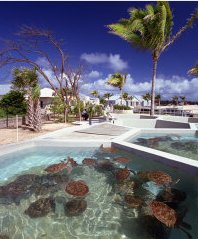
Canadian university plans to kill 7 Cayman turtles
 (Vancouver Sun): Endangered green sea turtles that have been part of a University of BC research project for more than 10 years will be killed sometime this spring. Bill Milsom, head of UBC’s zoology department, said seven turtles from Cayman will be killed in order to complete a study into turtle diving depths. The turtles are at least 10 years old and can live to be 30. The study was designed to measure the impacts of climate change on the animals and to help countries develop policies around fishing. Milsom said it would be impossible to free the turtles, which were born in captivity and brought to Canada from the Cayman Islands Turtle Farm in 1997 and 2003.
(Vancouver Sun): Endangered green sea turtles that have been part of a University of BC research project for more than 10 years will be killed sometime this spring. Bill Milsom, head of UBC’s zoology department, said seven turtles from Cayman will be killed in order to complete a study into turtle diving depths. The turtles are at least 10 years old and can live to be 30. The study was designed to measure the impacts of climate change on the animals and to help countries develop policies around fishing. Milsom said it would be impossible to free the turtles, which were born in captivity and brought to Canada from the Cayman Islands Turtle Farm in 1997 and 2003.
A spokesman for an animal rights group said it makes no sense to kill an endangered species and questions why the turtles can’t be spared to "live out their final days in peace."
"At a time when there are all sorts of efforts to save these animals, and they’re being hit by oil spills and beach development, UBC is killing them," said Brian Vincent, from the group called Stop UBC Animal Research.
Vincent said his group was told first about UBC’s plan to have the turtles killed by someone at the university, who believed the decision was prompted by the pending demolition of the building where they are housed in a tank measuring 10 metres by three metres.

Sea Turtle Tastes Like Veal
(reason.com): If sea turtle tasted like chicken, I’d fess up, but it really does taste like veal. I grew up occasionally eating mud turtles pulled out of the ponds on my family’s farm. And mud turtle does taste like chicken. (Legs from freshly butchered mud turtles also writhe when you toss a bit of salt on them, as my startled mother once found out.)
So I was pleasantly surprised to discover just how delicious well-prepared green sea turtle steak tasted with a port wine reduction sauce at the Over the Edge restaurant during a recent visit to Grand Cayman Island.
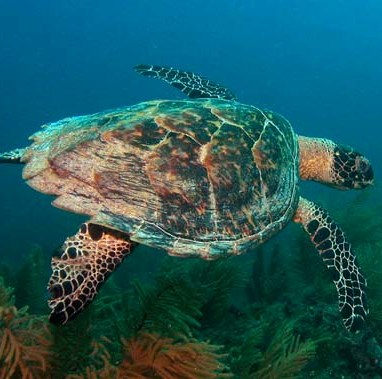
Mac backs turtle meat hike
 (CNS): An opposition motion to review the price of turtle meat was rejected by the government yesterday afternoon when the premier offered his backing to the recent decision by the farm management to triple the price. The premier said the increase was about reducing demand for the meat to sustainable levels until the farm could tackle the problems of supply it faced as aresult of difficulties with the breeding programme. McKeeva Bush explained to the Legislative Assembly that while it may be the country’s national dish and a cultural tradition enjoyed by Caymanians, no one was addicted to turtle meat and no one would die if they couldn’t afford to eat it for a while.
(CNS): An opposition motion to review the price of turtle meat was rejected by the government yesterday afternoon when the premier offered his backing to the recent decision by the farm management to triple the price. The premier said the increase was about reducing demand for the meat to sustainable levels until the farm could tackle the problems of supply it faced as aresult of difficulties with the breeding programme. McKeeva Bush explained to the Legislative Assembly that while it may be the country’s national dish and a cultural tradition enjoyed by Caymanians, no one was addicted to turtle meat and no one would die if they couldn’t afford to eat it for a while.
Bush was responding to the opposition’s suggestion that government review the prices again as their constituents had made considerable representations to them. Leader of the Opposition Kurt Tibbetts, who submitted the private member’s motion, said he had concerns people would turn to poaching if they could no longer afford to buy it from the farm.
“It may seem like a frivolous motion but there has been tremendous representation to us, especially from constituents in the Sister Islands,” he said, noting that Moses Kirkconnell had seconded the motion. Tibbetts asked government to apply some of the $9 million subsidy that Boatswain’s Beach receives from the public purse to cover any losses incurred in producing meat to enable local people to still have access to the meat sometimes, even if the supply was restricted.
While the price hike would certainly reduce the demand, Tibbetts said that it was unlikely to reduce the desire, which could have a detrimental impact on the wild population if people took to taking turtles from the ocean illegally as he suspect some people might do. “There is poaching already and no one can say it won’t occur," the leader of the opposition added. “The marine officers are already limited and they can’t cover all the areas 24/ 7; it’s going to be very difficult to apprehend those who have a real intention to take the turtles,” he said. “My biggest fear is what is going to happen to those in the wild.”
However, Bush told the opposition leader that this was a make or break situation for the turtle farm and that it needed these increases to balance the demand to realistic levels and give the breading programme a chance to restore the stocks. If not, he said the farm would simply run out in less than 18 months time. He also stated that the farm was moving towards a policy that what was sold had to cover its costs and the new price reflected the true cost of production as well as the whole issue of sustainability.
“If it sells for anything less it won’t sustain production,” the premier emphasized. He also noted that, at present, by selling the meat at less than its true cost the turtle farm was subsidising commercial restaurants. But, he said, despite the increase the price still compared favourably to other foods such as Maine lobster, rack of lamb and filet mignon, and that people had to understand that while it was a Caymanian traditional dish it was a luxury food. “How can we charge so very little for something so precious?” the premier asked.
Contributing to the debate, Kirkconnell said there was not a single member in the House who did not want the turtle farm to succeed but he believed his constituents on the sister Islands were considerably less close to the other benefits offered by the turtle farm than those on Grand Cayman. With the price hike he said they could no longer afford to buy the meat and they would likely poach it. He said he hoped the management at Boatswain’s Beach could find a way to make it affordable so Caymanians could buy it.
Refusing to support the opposition motion, the premier said, “We know they cherish it but they won’t die if they don’t get a pot of stew.”
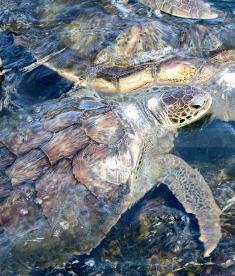
Turtles get fighting chance
 (CNS): Giving the ongoing struggle to address the breeding problem at the Cayman Islands Turtle Farm, a recent undisclosed donation from a local law firm will give five of the farm’s breeders a fighting chance to reproduce this year. Appleby will be sponsoring Buckshot, Florence, Honey, Old Yellow and Submarine for the 2010 calendar year. With 2,274 pounds and 175 years between them, the contribution should help the farm’s experts get to grips with the current problems associated with the hatchling and other efforts to understand and protect the endangered marine turtles.
(CNS): Giving the ongoing struggle to address the breeding problem at the Cayman Islands Turtle Farm, a recent undisclosed donation from a local law firm will give five of the farm’s breeders a fighting chance to reproduce this year. Appleby will be sponsoring Buckshot, Florence, Honey, Old Yellow and Submarine for the 2010 calendar year. With 2,274 pounds and 175 years between them, the contribution should help the farm’s experts get to grips with the current problems associated with the hatchling and other efforts to understand and protect the endangered marine turtles.
“The community’s involvement in the conservation of sea turtles is a very important part of our work at Cayman Turtle Farm,” said Geddes Hislop, Cayman Turtle Farm’s Curator of Terrestrial Exhibits and Education Programs. “We are grateful that Appleby saw the value in sponsoring five breeder turtles and we hope that other businesses and individuals within the community will follow the example this firm has set”.
Huw Moses OBE, Appleby Cayman Managing Partner said the firm was conscious of the community and environment. “The sea turtle is a significant part of the history of these islands and it is important that initiatives such as the breeder turtle sponsorship program are sufficiently supported. Appleby is pleased to make this valuable contribution to the Cayman Turtle Farm and the Cayman Islands,” he stated.
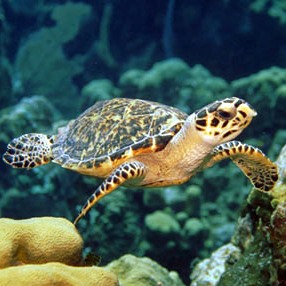
Wild turtles at risk
 (CNS): A number of concerns have already been raised by enforcement agencies that, while protecting the farmed turtles, the recent price increase could put the wild turtles in greater danger from poaching. There are currently only eight valid legal turtle fishing licenses in the Cayman Islands, but poaching of turtles from the wild is not uncommon, especially among some of the community’s drug addicts, who often poach a range of marine life to fund their habits. The move by the Cayman Turtle Farm is to reflect the real cost of farming the marine creatures and to protect the future of the farm, the new managing director said on Friday.
(CNS): A number of concerns have already been raised by enforcement agencies that, while protecting the farmed turtles, the recent price increase could put the wild turtles in greater danger from poaching. There are currently only eight valid legal turtle fishing licenses in the Cayman Islands, but poaching of turtles from the wild is not uncommon, especially among some of the community’s drug addicts, who often poach a range of marine life to fund their habits. The move by the Cayman Turtle Farm is to reflect the real cost of farming the marine creatures and to protect the future of the farm, the new managing director said on Friday.
Sources in the police service and the director of the DoE have warned, however, that while the price increase may be welcome for some reasons, it may also have ramifications for poaching that will require considerably more resources to protect the endangered wild turtle population.
Police sources have told CNS that when the legitimate price of turtle meat increases, the price on the black market will also be driven higher, making the meat a more attractive proposition to poachers, who will be more willing to risk catching the creature in the wild if they can secure a better price for their illegal quarry.
Many poachers caught by DoE and the RCIPS Marine Unit are more often that not drug users, who turn to the ocean as an easy source of income for drug money. Therefore, any move that affects prices of illegally caught fish or turtle will attract the poachers and place marine life at risk.
The director of the DER said that the price increase on the one hand is to be welcomed if it makes people think twice about consuming the endangered creature and buys the farm time to work out what the problems are with the breeding and survival of hatchlings. On the other hand, it is likely to trigger more poaching. With a tight budget and resources already pushed to the limit, Gina Ebanks-Petrie explained that it would be very difficult for her department to step up the patrols to match a likely increase in poaching.
“We already find it very difficult to enforce the marine laws with our limited resources and this is likely to add to the pressure," she said. “We are well aware that turtle poaching is not uncommon and we have pursued poachers through the court system, but we know they are still out there and active already.”
Price increases could see poachers getting braver and attempting to take more turtles from the wild, and without an increase in enforcement resources, it will be difficult for the DoE to address a rise in numbers.
Concerns have alos been raised about the Turtle Farm’s own security and protection of its own stocks as the facility has had a number of problems in the past of turtles going missing from the farm.
The price increase was announced by the new MD Tim Adam, who after only nine days on the job made the decision to triple the price of meat. The idea of a significant price increase has been in discussion at the facility for several years but Adam appears to be the first MD willing to bite the bullet and make the tough decision, which he said was a difficult one.
In a statement on Friday, he said that the price to produce the turtle was far higher that the price of the meat and the facility was constantly losing money. He said it was the first of many tough decisions that he would make in order to protect the future of the breeding programme and the farm in general.
The price of turtle steak was increased on Monday from $9 per pound to $27, turtle stew from CI$5.40 per pound to CI$16.00 per pound, turtle menavelin from CI$4.00 per pound to CI$12.00 per pound, and the bone from CI$2.00 per pound to CI$6.00.
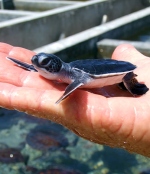
Turtle meat price soars
 (CNS): The new managing director of the Turtle Farm has made his first major decision, which will see the cost of turtle meat triple in price. In a written statement issued on Friday evening, Timothy Adam, who has been in post less than two weeks, said the business now needs to raise the selling price on turtle meat to reflect the true cost of production and maintenance of the Cayman Turtle Farm facilities. From Monday, 8 February, turtle steak will cost CI$27.00 per pound, three times its current price. Recognizing the cultural significance of the meat, the new MD and the board said they were committed to doing what it takes to protect the future of the farm.
(CNS): The new managing director of the Turtle Farm has made his first major decision, which will see the cost of turtle meat triple in price. In a written statement issued on Friday evening, Timothy Adam, who has been in post less than two weeks, said the business now needs to raise the selling price on turtle meat to reflect the true cost of production and maintenance of the Cayman Turtle Farm facilities. From Monday, 8 February, turtle steak will cost CI$27.00 per pound, three times its current price. Recognizing the cultural significance of the meat, the new MD and the board said they were committed to doing what it takes to protect the future of the farm.
According to the statement, the price of the turtle stew will rise from CI$5.40 per pound to CI$16.00 per pound, turtle menavelin will rise from CI$4.00 per pound to CI$12.00 per pound, and the bone from CI$2.00 per pound to CI$6.00.
Calicia Burke, Marketing Manager at the farm, said that farmed turtle meat is one of the rarest forms of food as it is found only in the Cayman Islands and only from the Cayman Turtle Farm. "Our farm avoids the need for any green sea turtles to be taken from the wild by the general public. Our aim is to continue facilitating conservation and preservation of the species through our strategies of commercialization, leading-edge research and technological development of green sea turtle farming,” she said.
Adam pointed out that the sale of turtle meat to restaurants and the general public has always been a very important function of the Farm, but the price was far below the cost to produce it, and the facility was constantly losing money on that portion of the business.
“One of my first priorities after taking this job was to begin a process of closely examining every aspect of our operations to determine if they were being run efficiently and were commercially viable,” said Adam. “Looking closely at the farm operations it was immediately clear that the price being charged for turtle meat would not allow the proper operation of the farm. The supply of turtle meat in Cayman is in jeopardy and could dry up in the very near future without significant re-investment in the turtles, their feeding and care or even the farm facilities.”
Since Hurricane Michelle in 2001, when much of the Farm’s breeding herd disappeared and much of the breeding facility was rendered unusable, the farm has struggled to improve its breeding programme and reverse the issue of declining turtle stock. Adam emphasized that setting a reasonable pricing structure was the first step in being able to properly re-invest in the farm and reverse this unsustainable trend.
The farm has recently reported problems with turtle eggs not hatching, which is impacting the farm’s ability to produce meat,, and is currently engaged in a research project to examine the diet of the turtles at the farm and how that compares to that of wild turtles and the nutritional value.
To ensure the long term sustainability of the Cayman Turtle Farm and the availability of turtle products the MD said there was a need to increase the meat’s selling price and that the meat still compared in price to lobster, which is a similarly scarce meat.
There had been no increase in the price of turtle meat since the mid 1990’s, despite increasing costs and the increased scarcity of supply.
“There is no doubt that our local turtle population would become endangered without the research and conservations efforts of the Turtle Farm," added Adam. “We have a responsibility to ensure that future generations of Caymanians can enjoy the traditions of our islands, and the turtles are an important part of that.”
Adam said this was just the first step in a series of wide ranging changes to be implemented over the coming months at Boatswain’s Beach with the aim of making the entire facility a commercially viable entity. “The decision in regards to the pricing of the turtle meat was an obvious first place to start” he added.
Ken Hydes, Chairman of the Board, backed his new MD and said more difficult decisions lay ahead. “I can assure the public that these decisions are being made with the long term best interest of the shareholders, the Caymanian people. This is the reason the board felt it was essential to bring in someone with Tim’s experience and capabilities. We are extremely confident that he is the right man to turn things around at Boatswains Beach and he has the full support of the board and senior management team,” the chair said.

Tim takes on the turtles
 (CNS): The former CEO of Cable & Wireless, Timothy Adam, is the new managing director of Boatswain’s Beach and he takes on the controversial turtle challenge from Tuesday 26 January. Excited about what he acknowledges will not be an easy job, Adam told CNS he is thrilled to be working with what he believes is a passionate team and committed board, but is under no illusions regarding the work ahead of him. Adam said that Boatswain’s Beach is like a “fine ship, with a great crew which has been sailing in rough waters,” and he has vowed to do what he can to make the facility financially viable.
(CNS): The former CEO of Cable & Wireless, Timothy Adam, is the new managing director of Boatswain’s Beach and he takes on the controversial turtle challenge from Tuesday 26 January. Excited about what he acknowledges will not be an easy job, Adam told CNS he is thrilled to be working with what he believes is a passionate team and committed board, but is under no illusions regarding the work ahead of him. Adam said that Boatswain’s Beach is like a “fine ship, with a great crew which has been sailing in rough waters,” and he has vowed to do what he can to make the facility financially viable.
Since Joey Ebanks resigned from the post last April in orderto campaign for a seat in the Legislative Assembly on behalf of the PPM in North Side, the facility has been leaderless at a time when it has been haemorrhaging millions of dollars of public funds. Joe Parsons, the facility’s biologist and turtle expert, has been holding the fort, and Adam commended him and the team for keeping the facility going in such adverse circumstances. “They have all done an incredible job,” he said. “Running such a complex facility when you already have a complex technical job, such as Joe Parsons has, is no mean feet.”
The controversy over the facility’s spectacular losses were almost eclipsed when it was revealed last year that Ebanks, the former MD, had borrowed some $65,000 in salary advances without the knowledge of the farm’s board. A subsequent report by the Auditor General revealed that not only had Ebanks been signing his own cheques for the salary advances over a considerable period he had also run up a $6000 bar bill buying booze and cigarettes on the public dollar, in what Ebanks later claimed was a promotion for the farm’s Schooner restaurant, to try and attract customers to the facility which had failed to achieve anything like the anticipated visitor numbers.
Boatswain’s Beach, which was a redevelopment of the original Cayman Islands Turtle Farm, cost more than $62 million to build and has perpetually drained enormous amounts of public funds. Questions about the facility’s future have ranged from selling all or part of the business to diversifying elements of what is already a very diverse facility.
Designed as a cultural heritage site as well as a tourist attraction, Boatswain’s Beach it is still meant to be home to the Turtle Farm, where the preservation of the endangered sea turtle sits awkwardly with the farming of those endangered species to satisfy the local demand for the meat.
Adam said he recognised the diversity of the facility but he intended to strive towards achieving the vision statement of the farm, which is to make it Cayman’s preeminent cultural attraction. “There is no doubt that some significant changes are needed to make the facility work, but I want to make sure that the changes we make are the right changes,” Adam said.
He noted that there would be many challenges along the way and he knew that expectations would be high as the facility had become the focus of so much public attention. He said he was willing to take it on and he hoped that the community would rally round and offer their support and prayers to make the facility work. Adam also promised to be open and transparent about the changes he would eventually make.
Well aware that he will not be able to turn things around over night, he told CNS that he was really excited about taking up the post of MD. Ever since he stepped down from the helm of Cable & Wireless, Adam said he had hoped to find something exciting in the tourism industry, a sector very close to his heart as a result of his family’s association with the development of Cayman’s tourism product. He said his experience at the helm of the telecoms firm as well as his attraction to the tourism business would stand him in good stead.
Although too early to say exactly what he planned to do to turn things around at Boatswain’s Beach, Adam said he had a number of ideas about the facility’s future and he intended to spend the next few weeks learning everything he could from the board and staff to see if his vision dovetailed with what their on-the-ground experience tells them is viable.
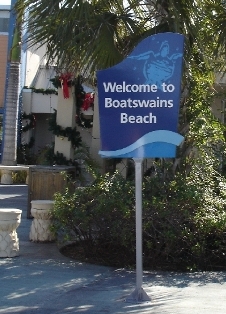
Joey reveals chaos on farm
 (CNS): Boatswain’s Beach, the home of the Cayman Turtle Farm, has been described as chaotic, out of control and badly thought out by the former managing director of the facility. During his appearance before the Public Accounts Committee (PAC) to answer questions arising from the auditor general’s report about his salary advances, Joey Ebanks also revealed a laundry list of problems with the Turtle Farm. He said his time there was all about fighting fires and that some fundamental mistakes were made during the establishment of the facility, from the name change to the kind of attractions to be featured.
(CNS): Boatswain’s Beach, the home of the Cayman Turtle Farm, has been described as chaotic, out of control and badly thought out by the former managing director of the facility. During his appearance before the Public Accounts Committee (PAC) to answer questions arising from the auditor general’s report about his salary advances, Joey Ebanks also revealed a laundry list of problems with the Turtle Farm. He said his time there was all about fighting fires and that some fundamental mistakes were made during the establishment of the facility, from the name change to the kind of attractions to be featured.
Ebanks said that from the beginning he faced massive problems at Boatswain’s Beach, not least the fact that the Office of the Complaints Commissioner had found the farm management guilty of maladministration regarding a 40-year-old problem over planning. He said there was no finance department at the facility, no accounts had been done and there was no real business strategy to direct how the facility could be sold now that it was built.
Ebanks suggested that the lack of a comprehensive business plan for the facility led to a lot of mistakes, and while he believed that the Turtle Farm could still be a fantastic attraction, some of the elements were ill-conceived. “It was not a great idea to have a marine life lagoon when the wildlife is already free all around the island,” he told PAC, adding that trying to keep the lagoon clean was impossible as the algae was unstoppable and no one wanted to swim with fish in a dirty pool when surrounded by beautiful turquoise oceans.
He also said changing the name from the Turtle Farm to Boatswain’s Beach was a mistake as the facility lost its connection to its own history and that trying to re-establish a new brand was an uphill struggle. Ebanks said he had developed a number of ideas that could have saved the facility, but the board was reluctant to adopt the various private-public partnerships and initiatives that he and his team came up with that would have seen parts of the attraction leased out to experts who could provide services, such as water slides and other amusements.
The former MD revealed that he had pursued a proposal from a waterslide company in Norway that was willing and able to set up a park at Boatswain’s Beach, which, he said, research had revealed was among one of these most popular attractions with tourists. He also said that the Butterfly Farm, which has since closed down, was looking at the possibility of moving its operations into the aviary.
However, Ebanks pointed the finger at the board for not acting on the ideas. He said the then minister Charles Clifford had liked his proposals and understood that the attraction in its current form was just not viable, but he had left the decisions down to board members and did not compel them to take action to try and stop the bleeding of the park’s massive operating losses.
During 2007 the attraction was losing about CI$650,000 per month, he said, and that was down to the amusement elements of the facility and not the original farm, which Ebanks said was still turning a profit. He explained that around 80 per cent of the revenue was coming from the Turtle Farm operation (the sale of meat), despite the breeding problems, while 80% of the operating costs were generated by the rest of the facility.
Ebanks also criticised the board for their lack of interest, as he said for months on end there would not be enough people turning up for meetings to make a quorum and sometimes he could not raise a single board member to dealwith critical problems. He described one occasion when he did not have enough funds to meet the facility’s pay-roll, but because he couldn’t track down a single member he had to go to the bank and organise an overdraft himself on good faith so he could pay staff.
Although Ebanks told the committee that he thought there was still an opportunity to create a tourism destination at the location alongside the farm, it needed private partners. He said the Turtle Farm could benefit from the dolphinarium and Andres Ugland’s plans for an antique auto museum and boutique hotel nearby if the facility offered things such as a water slide park, ice world and other popular tourist attractions. The farm still attracts around 400,000 visitors per year, but he said the new facility was redeveloped to attract many more and the current entry fee is hopelessly inadequate for the current numbers for it ever to be a viable concern.
The premier, McKeeva Bush, has said on a number of occasions that the failure of the attraction over the last few years since its refurbishment is down to the previous administration’s decision to reject the development of a pier in West Bay which could have delivered cruise passengers from the ship by tender directly to Boatswain’s Beach.
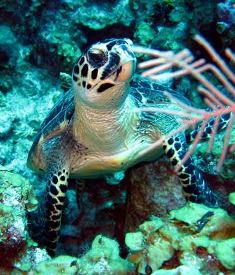
Turtle release to return
 (CNS): Once a regular and important event that was meant to be part of the turtle farm’s commitment to conservation, the annual turtle release is returning to Pirates Week. It has been more than two years since the farm returned any of the turtles it breeds back to the wild, however Casandra Hibbert, Director of Cayman’s Pirates Week has announced that it will be happening during the West Bay heritage day on Tuesday, 17 November on the Seven Mile Public Beach.
(CNS): Once a regular and important event that was meant to be part of the turtle farm’s commitment to conservation, the annual turtle release is returning to Pirates Week. It has been more than two years since the farm returned any of the turtles it breeds back to the wild, however Casandra Hibbert, Director of Cayman’s Pirates Week has announced that it will be happening during the West Bay heritage day on Tuesday, 17 November on the Seven Mile Public Beach.
Hibbert said she was very exited about the return of the release and added that anyone who would like to join in with a hands on approach can try their luck at being one of the chosen few to release the turtles into the water by visiting the Boatswain’s Beach attraction and sign up.
The draw for the winners will then take place on Friday 13 November (fireworks grand opening night) and all will be contacted via phone/ email. “This is a once in a lifetime event so I would suggest you getting up to Boatswain’s Beach quickly and adding your name to the pot,” said Hibbert.
The release has had its critics in the past however, some say the numbers released into the wild are so low as to not be bale to have any impact on the dwindling species numbers in the region and note that the risk to the endangered wild population from these farm bred turtles is not worth it.
Others however, have stated that part of the Cayman Turtle Farm’s reason to be is to help withthe conservation of the species as a pay back for selling these endangered species for meat. In recent years they say the farm for a number of reason’s including its own breeding difficulties has failed it is claim to have any role in the species conservation but merely adds to the struggle of turtles to survive because the farm condones the consumption of these at risk marine creatures.

Joey Ebanks goes from turtle to Rooster
 (CNS): Updated 2:15pm Listeners to Cayman Crosstalk Rooster 101’s morning phone-in show will be introduced to a new host on Monday morning and CNS has learned that the former Turtle Farm director and the PPM’s candidate for North Side Joey Ebanks will be the man joining Austin Harris has a co-host. Ebanks had been hosting the PPM’s own paid-for-show on Rooster during the election campaign but he will now become a permanent feature, replacing shock-jock Ellio Solomon who has taken up a seat on the back bench of the United Democratic Party government.
(CNS): Updated 2:15pm Listeners to Cayman Crosstalk Rooster 101’s morning phone-in show will be introduced to a new host on Monday morning and CNS has learned that the former Turtle Farm director and the PPM’s candidate for North Side Joey Ebanks will be the man joining Austin Harris has a co-host. Ebanks had been hosting the PPM’s own paid-for-show on Rooster during the election campaign but he will now become a permanent feature, replacing shock-jock Ellio Solomon who has taken up a seat on the back bench of the United Democratic Party government.
Ebanks told CNS that he is looking forward to starting his new media career with Hurely’s entertainment and says although he is member of the opposition party he won’t be looking to pull the government down for the sake of it.“We want to give this government a chance to get to work,” he said adding that while he may be PPM Cayman is his country too and he hoped the new government would get down to work addressing the issues and the show would be about constructive accountability.
Randy Merren, managing director of Hurleys Entertainment said he was impressed with the natural talent Joey demonstrated while hosting the PPM live forums. "For a person who had never broadcasted before, he showed a lot of ability.”
When asked if Ebanks was selected based on party affiliation, Austin Harris, said he was not.“Cayman Crosstalk has never been about party politics. It exists as a gate keeper to issues affecting the Cayman Islands. Now is the time for Cayman to come together to find solutions to our problems. We are looking forward to the fresh perspective Joey will add to our discussions and debates,” Harris added.
As Cayman Crosstalk hosts daily forums and debates over issues affecting all aspects of Caymanian life Merren said that Crosstalk is bigger than any of it’s hosts and the show must go on. “We are therefore delighted to welcome Joey as a member ofthe team."
As the show runs weekday mornings at breakfast time Ebanks told CNS said he will also be engaged in local consultancy work as he will not be going back to the turtle farm in any formal capacity but said he is always happy to offer advice and the benefit of his experience to the management team and board.
Cayman Crosstalk is aired Monday through Friday starting at 7am on Rooster 101.9FM contact caymancrosstalk@hurleysgroup.com with comments and questions or for more info.